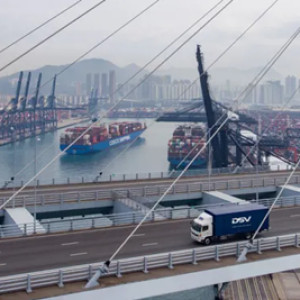DSV completes Schenker deal while Q1 air growth flattens

 DSV has completed its acquisition of forwarding giant Schenker and announced first quarter results, with airfreight volumes flat as the company noted a shift to sea transport. The Danish company today announced its results for the first quarter and also confirmed completion of its EUR14.3bn takeover of Schenker, a deal that will see it become the world's largest airfreight forwarder.
DSV has completed its acquisition of forwarding giant Schenker and announced first quarter results, with airfreight volumes flat as the company noted a shift to sea transport. The Danish company today announced its results for the first quarter and also confirmed completion of its EUR14.3bn takeover of Schenker, a deal that will see it become the world's largest airfreight forwarder.
Based on the published full-year 2024 financials for DSV and Schenker, the combined company had a pro forma revenue of approximately Dkr310bn and a total workforce of close to 160,000 employees in more than 90 countries. "DSV and Schenker are an excellent strategic match due to similarities in business models, services and strategies, and the combined company will benefit from strong customer relationships, industry vertical expertise, an agile global network and service offerings, combined with operational synergies," DSV said in a financial release. The deal is expected to boost full-year earnings before interest and tax (ebit) to Dkr19.5bn-21.5bn, compared with Dkr15.5bn-17.5bn.
First quarter results The forwarder's airfreight volumes were flat during the first quarter at 334,000 tonnes, but air revenues increased by 12% to Dkr13.6bn and gross profits improved by 5.6% to Dkr3.1bn. Volume performance lags behind its rival Kuehne+Nagel, which noted a 5% increase in air cargo volumes in the first quarter, and the overall airfreight market, which is estimated to have grown by around 2.4%, according to IATA.[1][2]
DSV said that in the first quarter last year, it had "extraordinary large, low-yielding volumes from a few customers" and when adjusted to take these volumes into account, its performance was in line with the market. The company said its airfreight market, excluding e-commerce and perishables, had a slow start to the year with lower volumes than expected, despite frontloading of some volumes in January ahead of potential trade tariffs and the Chinese New Year. "Demand for airfreight was negatively impacted by the widening price gap between sea and air, driving an increase in conversions from air to sea shipments," the company said in a results release.
"We estimate that our addressable market saw low-single-digit growth in Q1 2025. The highest growth rates were observed in January, and a more muted development in February and March." It added: "The development in airfreight was overall positive with strong momentum within the technology vertical."
DSV said its airfreight business benefited from higher average rates on services out of Asia Pacific to Europe. Meanwhile, the overall DSV company reported an 8.7% year-on-year increase in revenues to Dkr41.7bn, ebit was up 6% to Dkr3.7bn and profit improved by 17.5% to Dkr2.8bn. The company said performance was driven by higher average freight rates invoiced, especially in the first part of the quarter, and more value-added services on shipments across both air and sea freight.
Profitability also benefited from lower financial expenses.
Looking ahead to the rest of the year, the company is expecting the wider economic conditions to impact performance.
"Current trade tensions and uncertainties related to potential impact on demand from tariffs and weak macroeconomics may lead to global air and sea volume growth below global GDP growth in 2025," DSV said.
References
- ^ which noted a 5% increase in air cargo volumes in the first quarter (www.aircargonews.net)
- ^ to have grown by around 2.4%, according to IATA. (www.aircargonews.net)